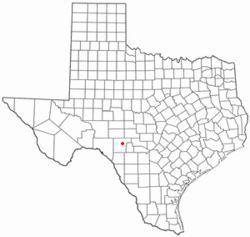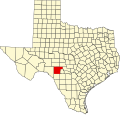Rocksprings, Texas | |
|---|---|
town | |
 Historic Rocksprings Hotel | |
 Location of Rocksprings, Texas | |
 | |
| Coordinates: 30°0′58″N100°12′32″W / 30.01611°N 100.20889°W | |
| Country | United States |
| State | Texas |
| County | Edwards |
| Area | |
• Total | 1.22 sq mi (3.15 km2) |
| • Land | 1.22 sq mi (3.15 km2) |
| • Water | 0 sq mi (0.00 km2) |
| Elevation | 2,402 ft (732 m) |
| Population (2020) | |
• Total | 874 |
| • Density | 719/sq mi (277/km2) |
| Time zone | UTC-6 (Central (CST)) |
| • Summer (DST) | UTC-5 (CDT) |
| ZIP code | 78880 |
| Area code | 830 |
| FIPS code | 48-62816 [2] |
| GNIS feature ID | 1345423 [3] |
Rocksprings is a town in and the county seat of Edwards County, Texas, United States. [4] At the 2020 census, the town population was 874, [5] down from 1,182 at the 2010 census [6] and 1,285 at the 2000 census. The town received its name from natural springs associated with the porous limestone rocks in the area.






